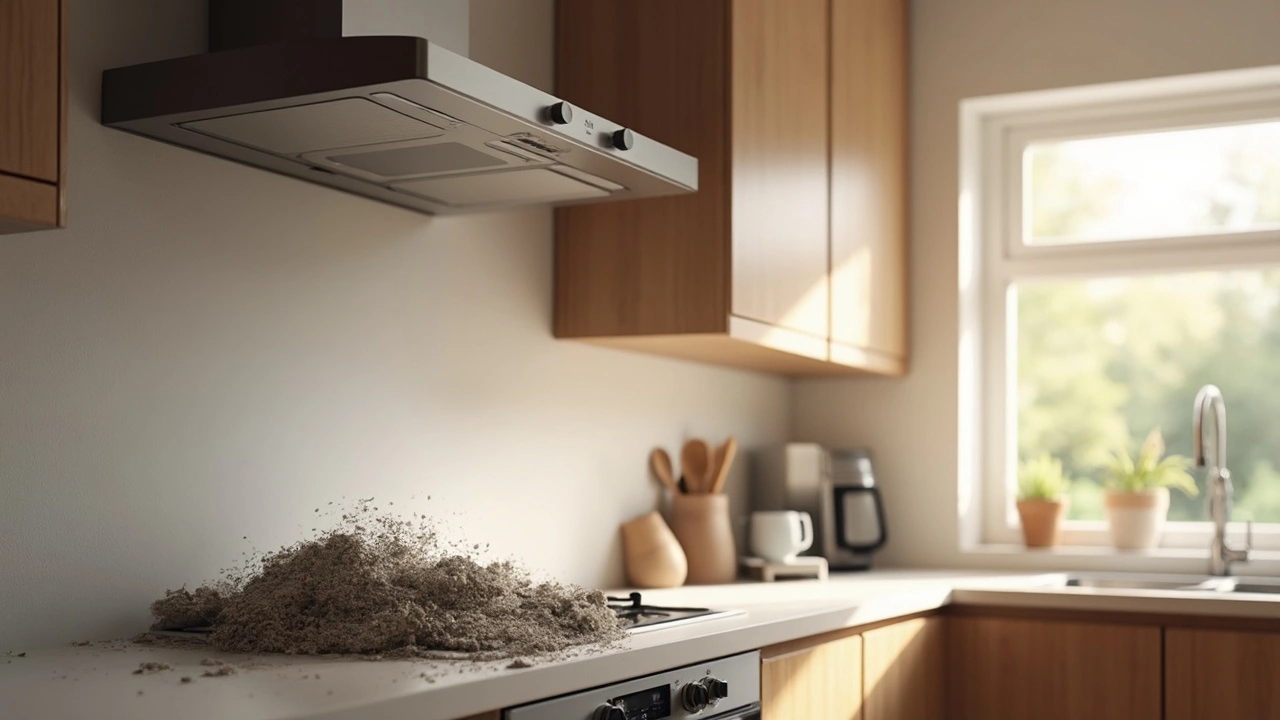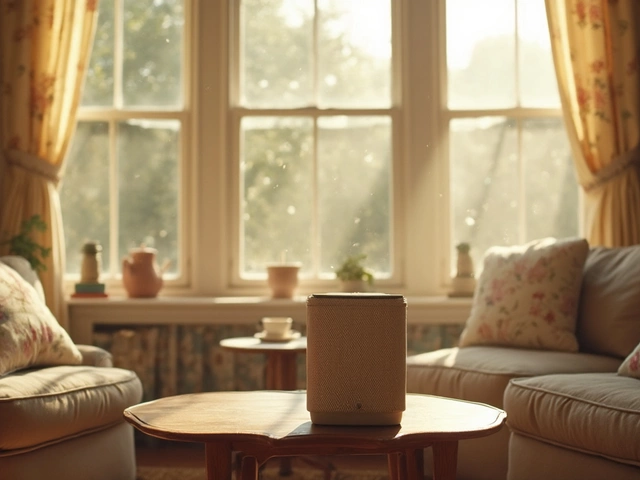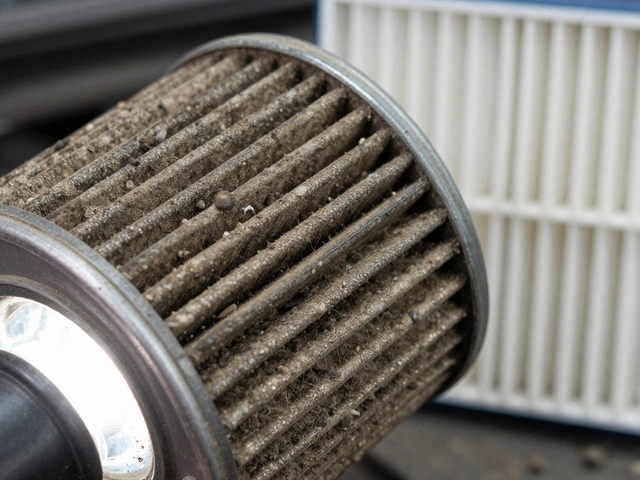If you’ve ever caught yourself wondering why your spaces seem stuffier than usual or why your allergies are acting up unexpectedly, there might be a culprit hiding in plain sight: your air filter. It might not be the most glamorous piece of hardware, but keeping it clean is crucial for maintaining a healthy indoor environment.
An air filter's job is to trap dust, pollen, and other annoying particles, letting the clean air flow freely through your vents. If it’s packed with dust bunnies and who knows what else, it’s time for a change. A clogged filter forces your HVAC system to work harder, spiking your energy bills and reducing air quality. So, how can you tell if your air filter's on its last legs?
- Understanding the Basics of Air Filters
- Signs Your Air Filter Might Need Changing
- Why Regular Checkups Matter
- Common Mistakes to Avoid
- Benefits of a Clean Air Filter
- Simple DIY Tips for Air Filter Maintenance
Understanding the Basics of Air Filters
Alright, let's break it down. An air filter is basically your home's first line of defense against dirt, dust, and all the little particles floating around that you can't see but definitely don't want to breathe in. They do wonders for air quality, especially if you've got allergies.
These filters come in all shapes and sizes, so one of the important things to know is what type of filter your home needs. They have ratings you should keep in mind called MERV, which stands for Minimum Efficiency Reporting Value. The scale goes from 1 to 16, and the higher the number, the more stuff the filter can trap. But be careful; too high a MERV rating might not be the best for your HVAC system.
There are a few main types of air filters you'll run into:
- Fiberglass filters: These are the most basic ones, usually cheap and disposable. They're good for trapping dust but won't do much against smaller particles.
- Pleated filters: These guys have more surface area and are good at trapping smaller allergens like pollen and mold spores.
- HEPA filters: If you want the gold standard, HEPA is where it's at. These filters catch almost everything but usually need a special system.
- Washable filters: Eco-friendly and reusable, but require regular cleaning to stay effective.
Why does any of this matter? Well, different filters have different lifespans and efficiency levels. So, knowing what type you're using helps you figure out when and how often it might need changing. Plus, using the right filter keeps your HVAC from working overtime, saving you money on those energy bills.
Signs Your Air Filter Might Need Changing
Noticing that your home isn't as fresh as it usually is? It might be your air filter waving the white flag. Here are some surefire signs that your air filter is overdue for a swap-out.
Air filters typically need changing every 60 to 90 days, but if you have pets or allergies, it's wise to check them more frequently. So, how do you know when your filter's tapped out?
- Increased Energy Bills: A clogged filter can make your HVAC system work twice as hard to push air through, leading to a spike in energy usage. Check your bills for any unexpected increases.
- Dusty Rooms: If you dusted a few days ago and the surfaces look like you haven’t touched them in months, your air filter might not be catching all the particles.
- Allergy Flare-ups: More sneezing, itchy eyes, and other allergy symptoms indoors can signal that your air quality is dropping fast.
- Weak Airflow: Is there barely any air coming out of the vents when your system is on full blast? Yep, that’s a tell-tale sign.
- Unpleasant Odors: A funky smell coming from the vents can mean your filter's chock-full of gunk.
According to HVAC expert Jordan Fisher, "Changing your air filter regularly is one of the simplest and most effective ways to keep your HVAC system running efficiently."
Take it from the pros; it not only saves you money but also keeps your home's air fresh and clean.
By keeping an eye out for these signs and acting quickly, you can maintain a healthier and more comfortable living environment. Your air filter replacement schedule might just be your new best friend when it comes to home upkeep!
Why Regular Checkups Matter
We get it, life gets busy. But when it comes to your air filter, putting off regular checkups can lead to a host of issues. Your HVAC system is like the lungs of your home. When the air filter is packed with dust, those lungs are working double-time, trying to move air through. That added stress can damage the system and, let’s be honest, no one wants to deal with those repair costs!
According to the U.S. Department of Energy, replacing a clogged filter can lower your air conditioner's energy consumption by 5 to 15 percent. That's not just good for your wallet—it’s good for the planet, too.
Regular checkups also mean cleaner air, which is crucial if you’ve got allergies or asthma. When a filter is dirty, allergens like pollen, mold spores, and dust mites circulate through the air in your home. Yikes!
- Energy Efficiency: By replacing your filter regularly, you can boost your HVAC’s efficiency, potentially saving you money in the long run.
- Air Quality: Regular checkups ensure harmful particles are caught and removed, keeping your home’s air fresh and clean.
- Longevity: Regular maintenance on your system can extend its life, delaying the need for a costly new unit.
So, give your air filter a glance at least every one to three months, depending on usage and whether you’ve got furry friends adding to the mix. Trust me, your wallet, your lungs, and your peace of mind will thank you.

Common Mistakes to Avoid
When it comes to taking care of your air filter, it's easy to slip up without even knowing. Let’s chat about some of the common blunders you might be making so you can keep your HVAC system in prime shape.
First off, ignoring the manufacturer's instructions is a big no-no. Not all air filters are created equal, and what works for one might not work for another. It’s like trying to fit a square peg in a round hole. Always check the manual for the recommended replacement schedule and specifications.
Another common misstep? Not checking the filter’s condition often enough. Waiting too long between checks is like playing a game of chance with your indoor air quality. Make it a habit to peek at your filter every month, especially during heavy usage periods like summer and winter.
Letting the wrong size slip back into the slot is more common than you’d think. Even being off by a fraction of an inch can mess with the efficiency and let all those nasty particles slip through.
Some folks forget or simply don’t realize that air filters come in different types with different filtration levels. Using the wrong type might leave your air short on quality or strain your system.
Lastly, think of forgetting to turn off your HVAC unit before swapping the filter. Seems minor, but it can push dust and debris right into your system, not to mention it’s a bit of a safety hazard.
Avoid these blunders, and your HVAC maintenance will be a breeze, keeping your home's air perfectly crisp.
Benefits of a Clean Air Filter
Keeping your air filter clean might sound like one of those chores you can skip, but it pays off big time. First up, it improves air quality by removing dust, pollen, and yucky particles. This is especially a lifeline for anyone with allergies or asthma because it helps reduce those constant sniffles and sneezes.
Moreover, a clean air filter lets your HVAC system breathe easy. When the filter isn't choked with debris, your system doesn’t have to work as hard to keep your space comfy. And let's face it, less strain on your HVAC system means more money stays in your pocket, thanks to lower energy bills and less wear and tear.
"Having a clean filter is like taking a deep breath of fresh air. It not only cuts down on energy use but also prolongs the life of your HVAC system," says John Carlston, a leading HVAC technician.
Also, clean filters mean no more weird smells or weird noises from your vents. Have you ever wondered why some homes have that musty smell no matter how much you air them out? Sometimes, that’s the fault of a clogged filter filled with dust and mildew.
Changing your air filters at least every three months is a smart habit. If you're using a high-efficiency filter or have pets, you might need to do it more often. Here’s a quick look at typical maintenance schedules based on different lifestyle scenarios:
| Living Situation | Recommended Filter Change |
|---|---|
| No pets/allergies | Every 3-4 months |
| One pet | Every 2-3 months |
| Multiple pets or allergies | Every 30-60 days |
In the end, keeping that air filter clean keeps your home healthy, your mind at ease, and your wallet happier. Plus, you'll feel the difference in air quality, and you might finally stop blaming your sneezes on the dog!
Simple DIY Tips for Air Filter Maintenance
Alright, so you’ve decided to tackle the air filter situation yourself. Awesome—it's easier than you might think! Staying on top of air filter maintenance can really make a difference in your home's air quality and your wallet. Let me share some straightforward steps to keep your filter in tip-top shape.
First off, you’ll want to check your air filter regularly, ideally once a month. It’s like one of those chores everyone forgets about until it’s too late. Set a reminder in your phone, and thank me later.
- Turn off your HVAC system: Safety first! Make sure your system is completely off to avoid any unwanted surprises.
- Locate and remove the filter: Find where your air filter sits. Usually, it’s in the return vent or near the air handler. If you’re unsure, a quick peek in your system’s manual should do the trick. Slide out the filter carefully so you don’t unleash a dust storm.
- Inspect the filter: Hold it up to the light. If you can’t see much light coming through, it’s time for a change. Even if it doesn’t look filthy, a change every 3 months is a good rule of thumb.
- Choose the right replacement: Check the dimensions on the old filter’s frame. Get the same size and consider upgrading to a filter with a higher MERV rating for better filtration.
- Insert the new filter: Make sure the airflow arrows line up with your system’s design. Slide it in, close everything up, and you’re all set.
If you're wondering how often to do this, here's a little guide:
| Environment | Filter Change Frequency |
|---|---|
| Low usage (vacation home) | 6-12 months |
| Average home with no pets | Every 90 days |
| Homes with pets or allergies | Every 60 days |
| Large households with pets | Every 30-45 days |
If you're running a HVAC system round the clock, consider seasonal changes. It helps the system breathe easy and keeps your indoor air fresh.
So there you have it! Keeping tabs on your air filter is simple but so rewarding. Follow these steps to enjoy cleaner air and a happier HVAC system.

